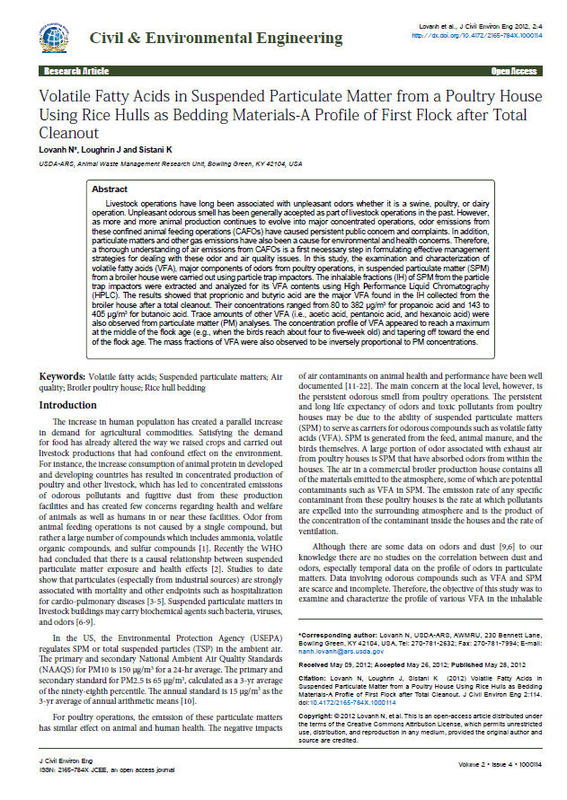Volatile Fatty Acids in Suspended Particulate Matter from a Poultry House Using Rice Hulls as Bedding Materials — A Profile of First Flock after Total Cleanout
Title
Volatile Fatty Acids in Suspended Particulate Matter from a Poultry House Using Rice Hulls as Bedding Materials — A Profile of First Flock after Total Cleanout
Date
Subject
Excerpt
Livestock operations have long been associated with unpleasant odors whether it is a swine, poultry, or dairy operation. Unpleasant odorous smell has been generally accepted as part of livestock operations in the past. However, as more and more animal production continues to evolve into major concentrated operations, odor emissions from these confined animal feeding operations (CAFOs) have caused persistent public concern and complaints. In addition, particulate matters and other gas emissions have also been a cause for environmental and health concerns. Therefore, a thorough understanding of air emissions from CAFOs is a first necessary step in formulating effective management strategies for dealing with these odor and air quality issues. In this study, the examination and characterization of volatile fatty acids (VFA), major components of odors from poultry operations, in suspended particulate matter (SPM) from a broiler house were carried out using particle trap impactors. The inhalable fractions (IH) of SPM from the particle trap impactors were extracted and analyzed for its VFA contents using High Performance Liquid Chromatography (HPLC). The results showed that proprionic and butyric acid are the major VFA found in the IH collected from the broiler house after a total cleanout. Their concentrations ranged from 80 to 382 μg/m3 for propanoic acid and 143 to 405 μg/m3 for butanoic acid. Trace amounts of other VFA (i.e., acetic acid, pentanoic acid, and hexanoic acid) were also observed from particulate matter (PM) analyses. The concentration profile of VFA appeared to reach a maximum at the middle of the flock age (e.g., when the birds reach about four to five-week old) and tapering off toward the end of the flock age. The mass fractions of VFA were also observed to be inversely proportional to PM concentrations.
Relation
Journal of Civil & Environmental Engineering
Volume 2, Number 4
 An official website of the United States government.
An official website of the United States government.


